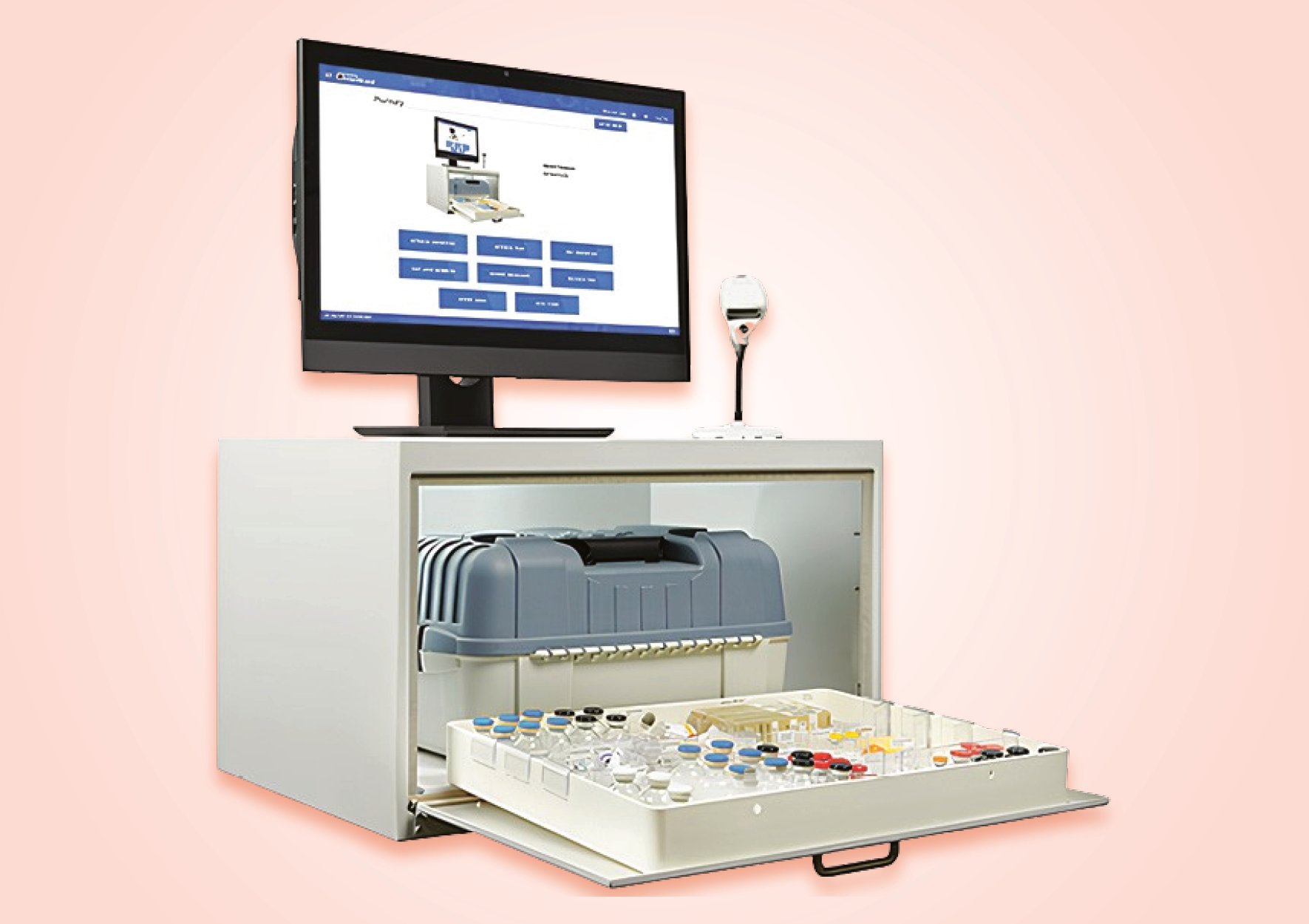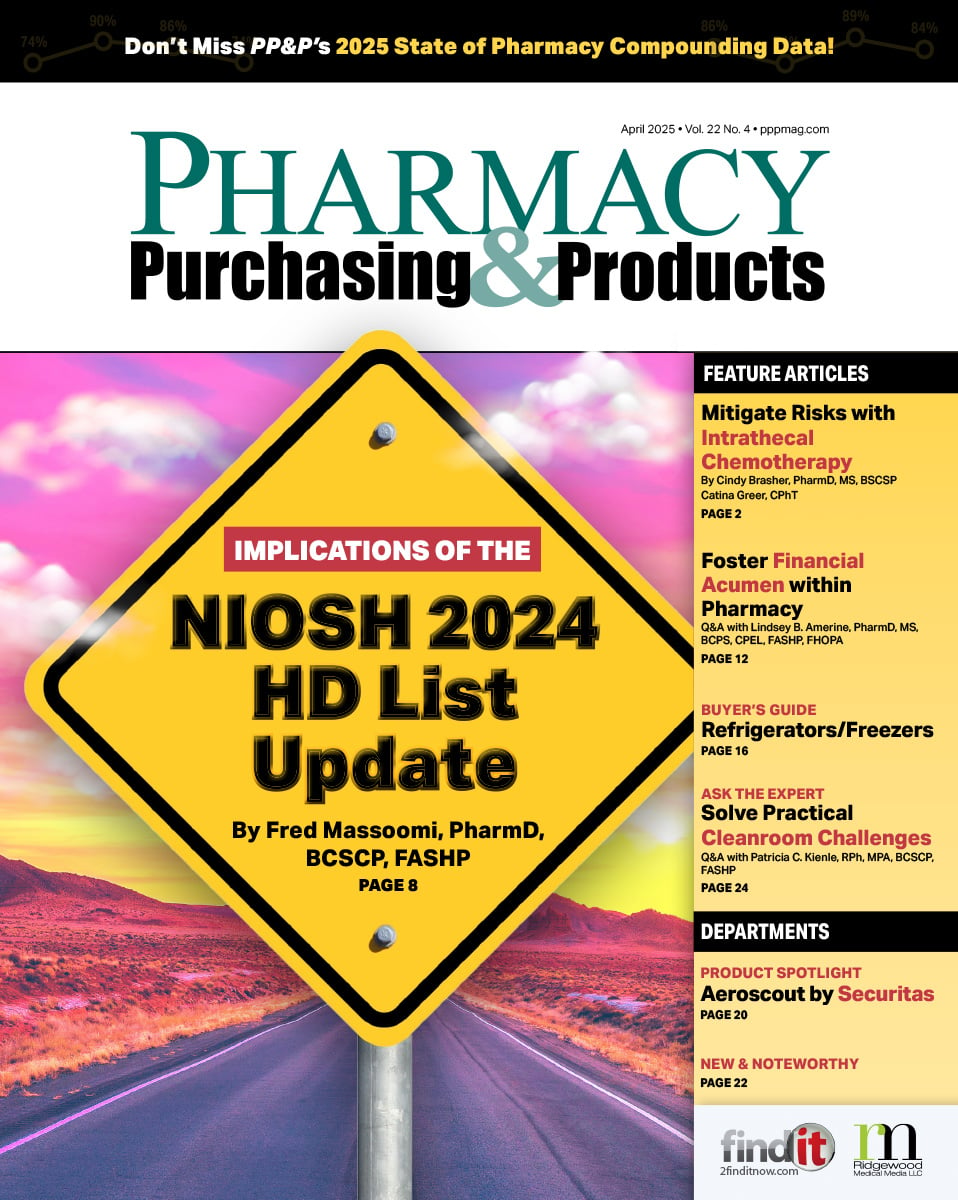- Show Menu
- Contact Us
- FAQs
- Reader Service
- Survey Data
- Survey Winners
- Testimonials
- Upcoming Events
- Webinars
- White Papers
Strategies for Expanding Ambulatory Care Initiatives
All too often, robust pharmacy services start and stop at a hospital’s front door, leaving a gap in the continuum of care following discharge. With rapid change now attendant to the delivery and reimbursement of health care services, hospitals must look to develop high quality, integrated ambulatory care pharmacy services. According to Pharmacy Purchasing & Products’ 2016 State of Pharmacy Automation Survey, many hospitals are embracing the opportunity to provide ongoing care; almost half (47%) currently operate an outpatient pharmacy, up from about one-third 5 years ago.1
Maine Medical Center (MMC) is a complete health care resource serving the people of greater Portland, the state of Maine, and northern New England. Licensed for 637 beds and employing more than 6000 people, MMC is the state’s only academic medical center, providing approximately one-quarter of charity care in the state. MMC’s care model includes the state’s largest multispecialty medical group, which provides a wide range of primary, specialty, and subspecialty care delivered through a network of more than 40 locations throughout greater Portland. Maine Health, a 12-member health system utilizing a shared electronic health record, is anchored by MMC as its largest member hospital.
In recent years, the MMC pharmacy took the opportunity to address a gap noted in ambulatory care services at MMC. Prior to this initiative, MMC had provided limited ambulatory care services to patients, consisting of some pharmacist presence in clinics. Our strategy for expanding ambulatory care initiatives was based on several guiding principles (see SIDEBAR).
Acquiring buy-in from key senior leaders was critical to the success of the project. Pharmacy spoke one-on-one and in small groups with these stakeholders, and then presented opportunities to expand ambulatory care pharmacy in formal meetings to senior level committees. From the onset, administration and other decision-makers were supportive of pharmacy expansion to provide comprehensive services at MMC.
Engaging Consultants
Once the MMC pharmacy received approval from hospital executives to develop and implement comprehensive ambulatory care initiatives, a decision was made to seek help from pharmacy consultants, as this was a novel pursuit for our team. A request for proposal was created to solicit responses from consultants with demonstrated expertise in a broad range of pharmacy services. The advantages gained by utilizing a consultant included expertise, validation, and speed-to-value to launch the ambulatory services. The consultants were engaged to assist with the following tasks:
- Evaluate the current state of ambulatory pharmacy services at MMC
- Assess new ambulatory pharmacy opportunities through data collection, market analysis, site visits, forecasting, and stakeholder interviews
- Develop program priorities tailored to MMC’s culture and strategic goals, including program development and timeline, governance model structure, planning, implementation, and measurements of success
- Complete a written executive summary of findings and recommendations, including a formal business plan, and present these findings to a stakeholder audience
- Provide guidance on implementation decisions
Components of the Ambulatory Pharmacy Business Plan
A robust ambulatory pharmacy business plan was developed based on the consultants’ analysis. Plan components included:
- Implementing an outpatient pharmacy (open access, retail and specialty)
- Increasing 340B contract pharmacy engagement
- Developing a medication transitions program, designed to engage pharmacy in medication reconciliation and improve transitions of care within the medical center
- Developing a PGY2 ambulatory care residency
- Allocating dedicated pharmacy services to the emergency department (ED)
- Establishing a pharmacy-managed anticoagulation clinic
- Implementing pediatric oncology infusion services
MMC pharmacy leadership presented the business plan to numerous committees to gain financial approval to make vital capital and operational investments. The consultants remained engaged and supported MMC pharmacy leadership throughout the implementation process.
Features of the Outpatient Pharmacy
The first major program to launch from MMC’s ambulatory care expansion initiative was the development of the hospital’s inaugural outpatient pharmacy. The outpatient pharmacy provides care to patients through various avenues. Three designations of focus include capturing employee prescriptions, providing prescriptions to patients being discharged and to those seen in onsite clinics, and increasing specialty prescriptions by implementing a specialty pharmacy. At the onset of development, goals were established to improve access to medications, improve the patient experience, and improve care transitions by minimizing fragmented medication management. In alignment with the MMC pharmacy’s guiding principles for program expansion, the outpatient pharmacy was built with the following features:
- Hours of operation: 24 hours a day, 7 days per week
- Employee discount (copay reduction)
- Payroll deduction for employees
- Prescription Assistance Program coordination (improves access to medications through alternative payments)
- Charity care sliding scale (free and discounted medications for qualifying patients)
- Discharge medication delivery and patient education at the bedside (including mobile payment)
- Specialty prescription services, to optimize patient outcomes and financial stewardship associated with high-cost medications
- Complimentary shipping for increased convenience (ME, NH, and FL). Many patients travel to Florida for extended periods during the cold Maine winter. Our pharmacy became licensed as a non-resident mail order pharmacy through the Florida Board of Pharmacy to facilitate the continued provision of prescriptions to patients in Florida
- Documentation in EMR to improve continuity of care throughout the health system
- 340B optimization and compliance

Implementation Strategies
MMC enacted an ambulatory pharmacy care steering committee that met monthly to oversee the development of the outpatient pharmacy. The executive sponsors of the committee included the chief financial officer and the chief operating officer; other departments represented on the committee included information systems, marketing and communications, legal, human resources, facilities, planning, project management, and consultants. The committee was charged with developing and implementing a strategy for pharmacy design and construction, technology and automation requirements, an effective staffing model, and several ambulatory care programs.
Pharmacy Design and Construction
The pharmacy was built in existing space adjacent to the hospital lobby. The layout was designed by a health care architecture firm with input from consultants and the ambulatory pharmacy steering committee. Special accommodations were made to support multiple rooms for private patient counseling, filling automation, and access to the hospital’s pneumatic tube station. A small space for over-the-counter products for patients, visitors, and employees was designated at the drop-off and pickup counter.
Technology and Automation
An information systems (IS) project team was established to quickly build technology infrastructures for the outpatient pharmacy. The team was led by an IS project manager and reported progress to the ambulatory pharmacy steering committee. The IS project team met weekly to ensure open communication and accountability to meet deadlines. Pharmacy administrators worked closely with the IS project team to select vendors for dispensing software, automation, interactive voice response (IVR) software, and point-of-sale software (see SYSTEMS SCOOP for a list of technologies and automation utilized at MMC). It was integral for the IS project team to be included in vendor discussions during the selection and implementation of all technologies. Priorities in vendor selection included identifying a pharmacy dispensing system that interfaced with MMC’s EMR, a specialty pharmacy case management system, and a point-of-sale vendor that accommodated secure bedside delivery payment.
The IS project team completed a full systems analysis, integration plan, and testing phase within the implementation timeline. In the month prior to go-live, while the pharmacy space was still under construction, a computer lab was set up to provide opportunities for the newly hired outpatient pharmacy team to become familiar with the pharmacy technology systems.
Staffing Model
Prior to the outpatient pharmacy opening in January 2015, there was no 24/7 pharmacy in the state of Maine, a fact that the steering committee took into account when determining the outpatient pharmacy’s hours of operation. The closest 24/7 pharmacy was over 50 miles away in New Hampshire. Therefore, it was determined that access to a 24/7 outpatient pharmacy at MMC was integral for patient care.
In order to properly staff the pharmacy, six clinical pharmacist FTEs and 12 technician FTEs were hired initially. More recently, bedside medication delivery and specialty pharmacy program expansions required additional pharmacist and technician FTEs.
Ambulatory Care Programs
Employee Care
Maine Health provides a self-insured health plan to over 25,000 employees and their dependents. To provide more care for plan members, the pharmacy implemented a first-year incentive of 10% off copays and 5% off deductible-driven medications. The following year, employee incentives increased to 20% off copays, and the pharmacy became the exclusive specialty pharmacy for the self-insured plan, a key component to the growth of the specialty pharmacy program.
Access to Affordable Medications
A comprehensive pharmacy charity care program was developed in coordination with MMC’s established charity care program offered for medical services. MMC’s finance department was engaged to assist with developing a sliding scale discount. With the help of consultants, a policy was developed to outline qualification requirements and medications excluded from discounts. In 2015, the MMC pharmacy wrote off almost one million dollars in prescription charges.
Bedside Delivery and Education
Coordination of the pharmacy’s meds-to-beds program began quickly after the opening of the outpatient pharmacy. For security reasons, hallways from MMC’s ED to the pharmacy are locked down during the late evening and overnight hours. As patients were unable to access the pharmacy during off-hours, it was instrumental for the pharmacy to deliver medications in order to provide care. MMC’s mobile payment software became available 3 months after opening, which improved the efficiency of bedside deliveries.
With mobile payment capabilities available, the meds-to-beds program quickly expanded to all inpatient departments. Providers use discharge delivery and education coordination forms to notify the pharmacy of expected discharges. The form provides information on the patient, the location for delivery, and the time requested for expected delivery. Most medications are delivered by pharmacy technicians and pharmacy students. A coordination effort exists between the inpatient and outpatient pharmacists to attend as many bedside deliveries as possible to provide patient education.
The meds-to-beds program continues to expand as more providers, nurses, care managers, and pharmacists become familiar with the program and process. A pilot program coordinates discharge deliveries through a consult note in MMC’s EMR, which reduces the need for handwritten forms.
Specialty Pharmacy Program
MMC’s specialty pharmacy program is integrated within the outpatient pharmacy’s dispensing footprint. In order to gain trust and share knowledge about this new program, pharmacy leaders attended team meetings at various MMC specialty clinics to introduce the specialty pharmacy program. With access to the health system’s shared EMR, pharmacy team members review medication lists, problem lists, and lab results to ensure safe and optimal medication use. Pharmacists and pharmacy technicians document their interactions with patients in the EMR to improve communication with all members of the health care team.
Pharmacists meet directly with patients and offer medication therapy reconciliation and optimization, targeted education to improve the patients’ understanding of medications or diseases, side effect counseling, and adherence interventions. MMC’s specialty pharmacy program utilizes an integrated model of care where pharmacists and pharmacy technicians work within MMC’s specialty clinics to meet with patients and providers. The pharmacy team members act as liaisons for improved care coordination and medication access, monitoring, and follow-up. The team proactively tracks patients to ensure therapeutic effectiveness and safety outcomes while also reducing gaps in coverage.
To increase standardization, the team strives to provide all of the medication needs for a patient and medication fills are synchronized to reduce multiple visits to the pharmacy. The pharmacy provides free mailed prescriptions to patients, a necessary offering for continued program expansion. MMC’s specialty pharmacy program is currently pursuing URAC and ACHC specialty pharmacy accreditation.
ED Pharmacist Expansion
The ambulatory pharmacy business plan added two pharmacist FTEs to MMC’s ED to improve medication use and delivery of care in this dynamic patient care area. Pharmacists document over 2300 interventions each year and coordinate medication use in critical care situations. The ED physicians are extremely satisfied with the addition of pharmacists to the ED.
Medication Transitions Program
Optimizing medication use throughout transitions of care is paramount to minimizing unnecessary medical expenditures and ensuring patient safety. The MMC medication transitions team, staffed with two pharmacists and three pharmacy technicians, targets high-risk admissions to prevent medication discrepancies and errors.
The team currently captures ~17% of medication histories for admitted patients. Pharmacy’s involvement in collecting medication histories has been shown to improve the accuracy of medication lists by capturing the best possible medication history (BPMH). A complete medication history can take 20 to 40 minutes as the pharmacy team confirms medication sources, including outside pharmacies, residential facilities, and provider offices. Having pharmacy own the role of creating the BPMH optimizes the process and reduces redundant efforts by multiple members of the health care team, and frees up time for providers and nurses for patient care. The medication transitions team identifies ~3.5 medication discrepancies per patient, many of which are clinically significant discrepancies, including incorrect/absent medications or incorrect dosage, frequency, or route. MMC has collaborated with the University of New England’s College of Pharmacy to engage pharmacy students in this work through an elective course. This unique partnership shifts learning from the classroom to the real world, where students are actively engaged in patient interviews and documentation of the BPMH.
The medication transitions team promotes the outpatient pharmacy through targeted messaging during patient interviews. In an effort to improve the hospital’s overall compliance with medication reconciliation completion within 24 hours of admission, the pharmacy team tracks each patient encounter and follows up with providers when necessary. Additional pharmacist and pharmacy technician position requests are currently under review to expand coverage of this service, with the optimal goal of having a pharmacy team member meet with every patient at admission to obtain the BPMH.
Maximizing 340B Opportunities
MMC’s participation in the 340B drug-pricing program enables the organization to carry out its mission. The intent of the 340B program, as defined by the Health Resources and Services Administration, is to stretch scarce federal resources as far as possible, reaching more eligible patients and providing more comprehensive services.2 The outpatient pharmacy’s sliding scale charity care program has expanded medication access for many who previously could not afford their medications. Additionally, enhanced service offerings, such as the medication transitions program, are made possible through participation in the 340B program.
Challenges and Lessons Learned
Developing new programs introduces opportunities to reflect on challenges and share lessons learned. One of the first obstacles we encountered was hiring the appropriate number of pharmacist and pharmacy technician FTEs to support a 24/7 pharmacy. Resource considerations had been determined in the business plan prior to establishing the pharmacy’s hours of operation. The pharmacy department had to pivot from its initial resourcing plans and repurpose approved positions to accommodate the new 24/7 strategy. Additional resources also were required to accommodate the pharmacy’s expanding specialty and bedside delivery programs.
Managing multiple contracts proved demanding in terms of time and resources. Contracts requiring a great deal of attention included those with a pharmacy services administrative organization, pharmacy benefit managers, and technology and automation vendors. Close communication and coordination between pharmacy and MMC’s legal and contract management department was critical to reduce delays in opening the pharmacy. Ultimately, we went live without having a full portfolio of insurances accepted, which was a challenge as we could not provide for some people desiring our care. Additionally, the pharmacy commenced operations before all necessary wholesaler accounts and pricing software became activated, which resulted in the creation of workarounds. Perseverance and repeated pressure on all parties involved were required to ensure our contracts were negotiated as quickly as possible.
Gaining employee buy-in to using the various unique services available from the outpatient pharmacy continues to be a challenge. Engaging employees to utilize the pharmacy required time and financial incentives. Pharmacy growth was slower to start than projected, as prescribers and patients needed to gain trust in a new program and shift behavior. Financial projections were initially aggressive and did not account for an adequate ramp-up period.

Benefits
Since the implementation of MMC’s first outpatient pharmacy, steady volume growth in both retail and specialty has provided improved access to medications and medication education for patients, caregivers, and community members (see FIGURE 1). Opening Maine’s only 24/7 outpatient pharmacy also has demonstrated the organization’s commitment to improving the health outcomes of individuals within our communities. Our generous charity care program provides improved medication access to patients in need; over 13% of prescriptions dispensed each month are for qualifying individuals who receive discounted medications through the sliding scale charity care program (see FIGURE 2).
Feedback from patients and providers has been overwhelmingly positive. The outpatient pharmacy has contributed to the organization’s overall commitment to carry out its mission of caring for our community, educating tomorrow’s caregivers, and researching new ways to provide care.

Future Plans
Growth from the outpatient pharmacy will continue to enable expanded pharmacy services. Due to the recent adoption of rules for collaborative therapy practice agreements in Maine,3 MMC is working to develop an ambulatory antithrombotic program led by pharmacists, and incorporate pharmacist resources at additional primary care clinics. MMC also is looking to create a PGY1 Community Pharmacy Residency Program and deliver immunizations and formal medication therapy management services to patients.
Pharmacy leadership looks forward to continuing to deliver exceptional ambulatory pharmacy services, while expanding the depth and breadth of services offered.
References
- Pharmacy Purchasing & Products’ 11th Annual State of Pharmacy Automation Survey. Outpatient Pharmacy. Pharm Purch Prod. 2016;13(8):80-82.
- 340B Drug Pricing Program. Health Resources and Services Administration Web site. www.hrsa.gov/opa/. Accessed September 14, 2016.
- 126th Maine Legislature. An Act To Allow Collaborative Practice Agreements between Authorized Practitioners and Pharmacists. www.mainelegislature.org/legis/bills/bills_126th/billtexts/SP039501.asp. Accessed September 1, 2016.

Brian T. Marden, PharmD, is the senior director of pharmacy at Maine Medical Center (MMC) in Portland. He attended the Massachusetts College of Pharmacy and Health Sciences in Boston, Massachusetts.

Andrea R. Lai, PharmD, is the director of ambulatory care pharmacy services at MMC. She attended Northeastern University in Boston, Massachusetts. Andrea’s professional interests include expanding the pharmacy profession within the ambulatory health care environment.
Brian Fontaine is a pharmacy student at the University of New England in Portland, Maine, with an anticipated graduation in the spring of 2017. His professional interests include ambulatory care and pharmacy leadership.
SIDEBAR
Guiding Principles for Expanding Ambulatory Care Services
- Improve patient and employee access to medications
- Enhance the patient experience through medication education, engagement, and motivation
- Maximize 340B program opportunities
- Increase continuity of patient care and minimize fragmented medication management
- Improve medication-related outcomes and reduce medication-related adverse events
- Build brand awareness through new community health service offerings
- Reduce employee health plan costs
- Turn the pharmacy from a cost center to a revenue center
Systems Scoop
- Architecture Firm: Perkins + Will
- EPIC’s Electronic Health Record
- Rx30’s Pharmacy Dispensing System
- Parata Max High-Speed Dispensing Automation
- Kirby Lester’s KL1 Tablet Counter
- Retail Management Solutions’ Star-Lite POS Solution
- iPad applications for Mercury Pay’s Vantiv POS and Rx30 POS Systems
- Rx-Net’s Prescription Pricing Solution
- MacroHelix 340B Management Software
Like what you've read? Please log in or create a free account to enjoy more of what www.pppmag.com has to offer.








